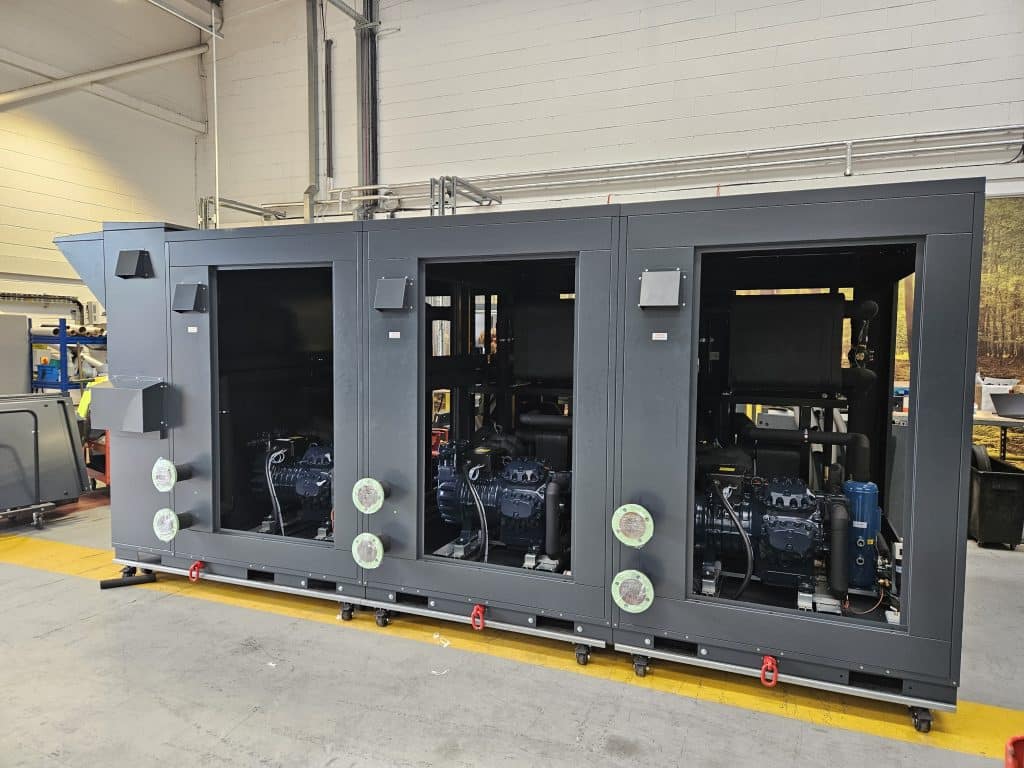Industrial Heat Pumps for Steam and Fuel Savings: Where They Work Best (and When They Don’t)

Can industrial heat pumps replace steam systems and cut fuel use?
It’s a fair question, and one that reflects the growing appetite to both cut carbon and control energy costs. But as always, the answer depends on the application.
In this article, we’ll explore where industrial heat pumps can displace fuel use, when steam can (and can’t) be replaced, and why commercial and light-industrial buildings are increasingly ditching gas in favour of high-efficiency heat pumps.
We’ll also be clear about where Clade fits into that journey, and why our natural refrigerant heat pumps are playing a critical role in fuel savings, even if they’re not replacing steam directly.
Steam: The Case for Fuel Savings
Steam has long been the go-to solution for high-temperature industrial processes: sterilisation, pasteurisation, drying, distillation. In sectors like pharmaceuticals, chemicals, and food processing, that’s unlikely to change anytime soon.
But the reality is that many buildings and facilities still default to steam, even when it isn’t needed. Hospitals, universities, housing associations, and leisure centres often use steam for heating or domestic hot water, when a low or medium temperature solution would be more efficient and less emissions-intensive.
That’s where heat pumps come in. And more specifically, that’s where Clade’s CO₂ and R290 heat pumps are delivering meaningful, real-world savings today.
Where Industrial Heat Pumps Can Replace Gas and Save Fuel
While our Clade CO₂ and R290 systems aren’t built for direct steam replacement, they are already displacing gas use in hundreds of commercial and light-industrial settings across the UK, often in projects where traditional gas boilers were the norm.
We’re seeing results in settings like:
- Hospitals and care homes seeking to decarbonise domestic hot water and space heating.
- Universities and schools replacing oversized, inefficient gas plants with modular heat pump systems.
- Housing associations retrofitting estates with low-carbon heating.
- Food and beverage facilities using LTHW and DHW rather than steam.
- Leisure centres where consistent hot water demand makes efficiency pay back quickly.
In all of these cases, Clade’s heat pumps are delivering practical, measurable reductions in gas usage, while also unlocking long-term benefits like maintenance savings, emissions compliance, and futureproofed system design.
How Industrial Heat Pumps Deliver Fuel and Energy Savings
At Clade, we’ve seen first-hand how CO₂ and R290 heat pumps can deliver meaningful energy and fuel savings in commercial and light industrial settings.
Thanks to high seasonal efficiencies, our heat pumps regularly achieve COPs between 2.5 and 4.0, depending on the site and setup. This translates into lower electricity usage per unit of heat output, reducing both running costs and carbon impact compared to gas-fired systems.
In one example, our R290 heat pump installation at Northumbria University contributed to a 58% reduction in Scope 1 emissions, replacing gas-fired heating with a natural refrigerant-based system. While every building is different, we consistently see significant carbon and gas savings, especially in cases where older boilers ran below their design efficiency.
Clade’s modular formats (such as the Rowan and Maple units) also allow for flexible system design and better part-load control, which improves real-world performance across seasonal variations. Systems can be tailored to work alongside thermal storage, buffer tanks, and on-site renewables to further enhance resilience and reduce peak loads.
Put simply: fuel savings aren’t theoretical. They’re showing up on bills, carbon audits, and emissions reports, and heat pumps are playing an increasingly central role in how organisations futureproof their heating strategies.
Avoiding Steam: When Heat Pumps Are the Better Fit
Clade heat pumps are not designed to produce steam. Our systems focus on hot water and low-to-medium temperature outputs, which are more efficient and better suited to the vast majority of commercial and light-industrial applications.
What they do is displace the need for steam in scenarios where it was never the best fit to begin with.
If your building needs 70°C hot water, not 160°C steam, then using a fossil-fuelled boiler to reach those temperatures is inefficient by default. It’s expensive, it’s emissions-heavy, and it’s increasingly unnecessary.
By switching to a high-performance heat pump running on CO₂ or propane, clients unlock fuel savings without the complexity of high-temperature steam systems. And in the process, they’re cutting carbon, reducing maintenance, and improving system resilience.
Smart Design for Maximum Heat Pump Efficiency
Maximising fuel savings isn’t just about picking the right kit: it means designing the system around it.
At Clade, we work closely with consultants, M&E contractors, and estates teams to get the design right from day one. That includes everything from return temperature optimisation to buffer tank sizing and stratification control.
For example, our CO₂ systems are designed around 30°C return temperatures, enabling us to maintain high COPs while still delivering up to 70°C DHW. That’s more than enough for most heating applications, especially when the system includes modular redundancy and intelligent control integration.
Smart design enables real performance, and real performance is what drives savings that show up on the balance sheet.
Talk to Us About Replacing Gas with High-Efficiency Heat Pumps
Still using steam for space heating or domestic hot water? You might be using more fuel, and spending more, than you need to.
At Clade, our high temperature CO₂ and R290 heat pumps deliver up to 80°C hot water, offering a good replacement for many steam-based or high-temp gas systems. They’re already cutting carbon and fuel use across the UK in hospitals, housing estates, universities and light industrial sites.
Whether you’re replacing an ageing boiler or rethinking your system entirely, our Elm, Acer 2 and Yew units give you high temperatures with natural refrigerants, and without overhauling your entire infrastructure.
If you’re ready to explore fuel-saving opportunities on your site, our experienced team can help you assess feasibility, design your system, and support delivery from start to finish.
Just get in touch to start the conversation.
